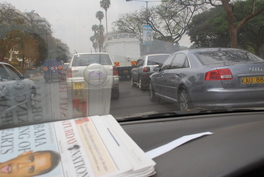Wangari Maathai's legacy. SJ Dodgson MJoTA 2011 v5n1 p930
In
Kenya, I remember water boiled and poured into insulated flasks and
carried for later consumption. No sight of disposable plastic water
bottles or sacks. I was told that was Wangari Maathai's doing; she would
not permit her beloved Kenya to be trashed with plastic bottles. Trees
planted, her doing. The beautiful open space that is Uhuru Park, she so
objected to building an ugly massive development
that the money folks pulled out.
I remember in Nigeria reading her book
and weeping over the stories of relatives forcibly conscripted to fight
European wars, and never any official word of their fates. I am
fighting for the right of every African to be healthy and educated
because lives of women like her and Florence Nightingale tell me I must.
I was searching for data about food and health on Sunday night late, when news started trickling from my Kenyan friends that Wangari Maathi had died overnight in what had been before Independence, the white man's hospital, Nairobi Hospital. I wrote the following:
Dr
Wangari Maathai died. I am so very sad. She was a scientist and a
heroine. So much she did. Hard to recall anyone who influenced health
and wealth and the environment as much as she.
I met her son in June 2004, in the human resources office of the Philadelphia College of Pharmacy and Science. A tall, good looking, confident young man who looked like an athlete. When his mother won her Nobel prize, he
had to nip off to Stockholm, which was when I realized who he was. He spent a year working in a Biochemistry lab, and then, I hoped, launched into a spectacular career.
Most men and women slip in and out of lives
and no-one notices; 100 years, 200 years from now, we will be talking
about Wangari Maathai. Thank you for living. You did well.
